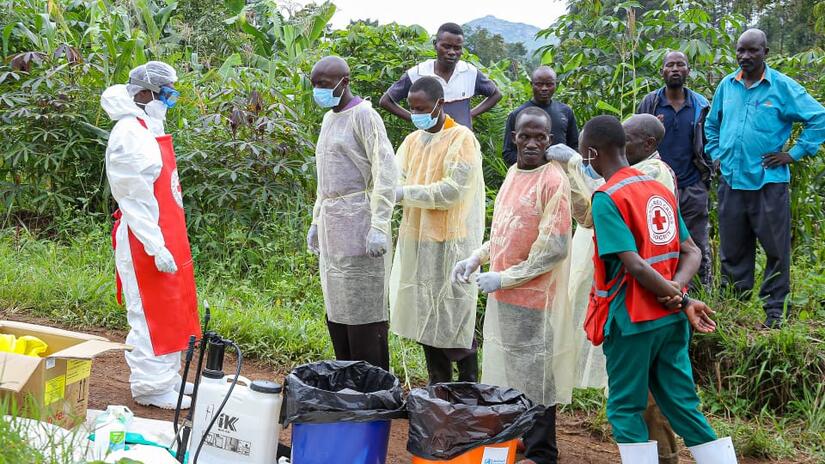In countries around the world, burial rituals—whether cultural, traditional, or religious—are an important way of honouring the dead and helping people grieve. For many communities, special burial practices enable them to bid farewell to their loved ones in a respectful and meaningful way.
Losing someone is never easy. But what if someone you love passes away, and you’re told that the burial traditions your community holds dear may put you all in danger?
This is what happened to people in Mubende, Uganda, in September 2022 when the country declared its first outbreak of Ebola in more than a decade. The government barred communities from burying their loved ones due to the risks involved, declaring that burials should be managed by trained safe and dignified burial teams.
Ebola is a cruel disease. Deadly when left untreated, and highly contagious, it’s transmitted from person to person through direct contact and bodily fluids. When someone is infected, their families and friends are unable to provide hands-on care. And when someone dies from Ebola, their body continues to be highly contagious for up to seven days, meaning that safe and dignified burial measures must be followed to prevent further infection.
Kuteesa Samuel from Mubende knows this all too well. He lost his wife of 20 years, Monica, to Ebola during the 2022 outbreak. Monica was seven months pregnant at the time, meaning Samuel also lost his unborn child.
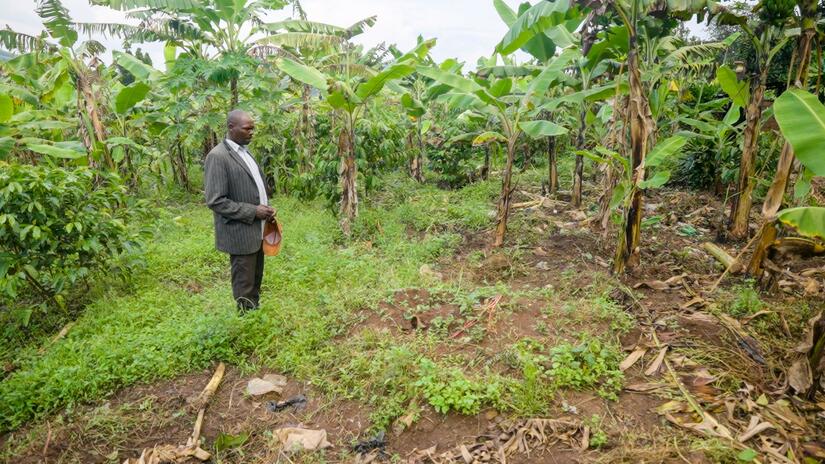
Kuteesa Samuel from Mubende stands next to the place where his wife, Monica, was buried after passing away from Ebola.
Photo: Paul Wu/IFRC
In Samuel’s culture, it’s customary to wash and wrap the body of the deceased. And if a pregnant woman dies in the community, tradition dictates that the foetus is buried in a separate grave. But during Ebola, these practices would have posed a deadly threat to people’s health.
Knowing this, the Uganda Red Cross Society were poised to step in.
Local, known, trusted
Uganda Red Cross staff and volunteers are part of the fabric of society in Uganda. They come from the communities they serve, follow the same local customs, and have a deep understanding of people’s needs and sensitivities when disaster strikes.
They therefore understood why Samuel’s community felt scared, confused, and reluctant to abandon their traditions.
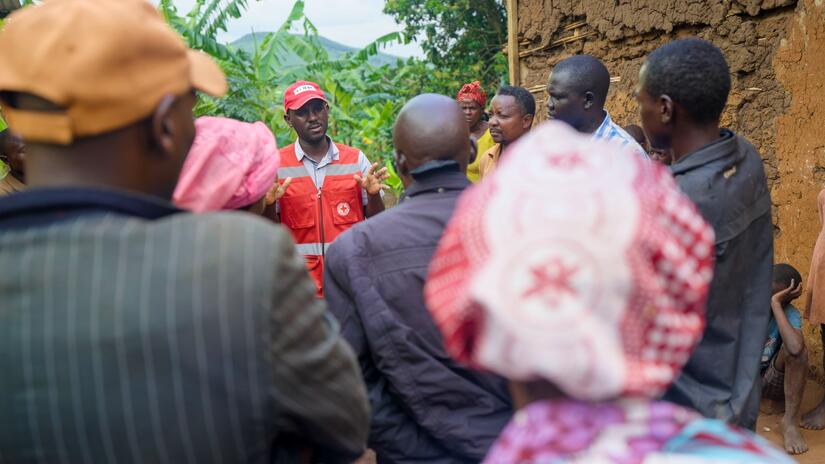
Dr. Joseph Kasumba, Uganda Red Cross Community Epidemic and Pandemic Preparedness Officer, speaks to people in Mubende about the importance of safe and dignified burials.
Photo: Paul Wu/IFRC
But following sensitive, patient, and repeated engagement from local Red Cross volunteers—who worked hand-in-hand with local health authorities and community leaders—Samuel’s community agreed to a compromise. Monica’s body was left intact and safely buried by trained Red Cross teams following strict health and safety protocols. While a banana flower was symbolically buried in a separate grave to mark the loss of Samuel’s unborn child.

A banana flower was chosen by the community to be buried, symbolising the loss of Samuel's unborn child.
Photo: Paul Wu/IFRC
“After the health workers engaged and explained everything to us, we came to an understanding. […] If it wasn’t for Uganda Red Cross, we would not even know where the deceased would be buried. They helped us to bury the deceased to ensure we don’t get infected. So, we greatly appreciate the Red Cross,” explains Samuel.
Preparedness saves lives
Since the last Ebola outbreak in 2012, the Uganda Red Cross Society had worked hard to improve its preparedness for future health emergencies and strengthen its auxiliary role supporting the Ministry of Health during disease outbreaks.
With support from the IFRC through the USAID-funded Community Epidemic and Pandemic Preparedness Programme (CP3), as well as through an Ebola preparedness emergency appeal (2018-2021) and a Disaster Response Emergency Fund (IFRC-DREF) operation (2018-2020), they undertook lots of different preparedness activities across different parts of the country.
Emergency preparedness involves planning for the worst, so one of those activities was developing a pool of qualified safe and dignified burials trainers and teams across the country. These teams were ready to be deployed immediately to support communities like Samuel’s when the 2022 Ebola outbreak began.
“CP3 was so instrumental to this response. We were only able to respond on time because we had done preparations. We already had prepared teams, and this enabled us to swiftly respond,” explains Dr Joseph Kasumba, Community Epidemic and Pandemic Preparedness Officer with the Uganda Red Cross who led the response.
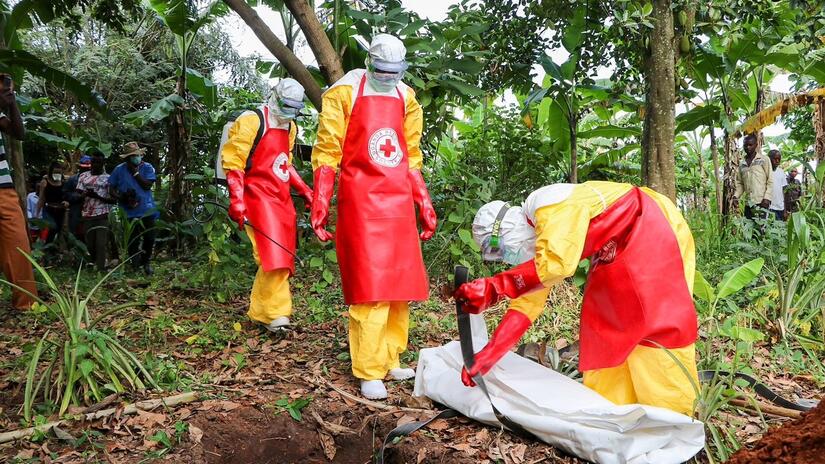
A Uganda Red Cross team prepares a burial site during the 2022 Ebola outbreak.
Photo: Uganda Red Cross Society
Humanity in the darkest of moments
During the 2022 Ebola outbreak, Uganda Red Cross teams conducted a total of 512 safe and dignified burials. These efforts contributed to the outbreak being declared over in a record four months.
What’s harder to quantify is the emotional support and meaningful care that Red Cross teams provided to communities in perhaps the worst moments of their lives. For that, here’s some powerful testimony from those affected by Ebola, or involved in the response:
“When it comes to Ebola Virus Disease, communities always need someone they can trust, people they can identify with. And the fact that the Red Cross is always part of the community... we know what cultural practices are done. We know what the community wants us to do and they feel confident identifying with us, even in that time of grief and sorrow.” - Dr Joseph Kasumba
“We really thank the health workers because they taught us how to protect ourselves. We are still grateful for what they did. It was a miracle for us.” - Janet, Mubende resident
“Since Ebola started in Mubende, it is the Red Cross that has walked with us. Every community knows Red Cross here. We appreciate you for the work you’ve done. The people of Mubende appreciate you for offering your lives to stand in the gap and save lives.” - Rosemary Byabashaija – Resident District Commissioner in Mubende
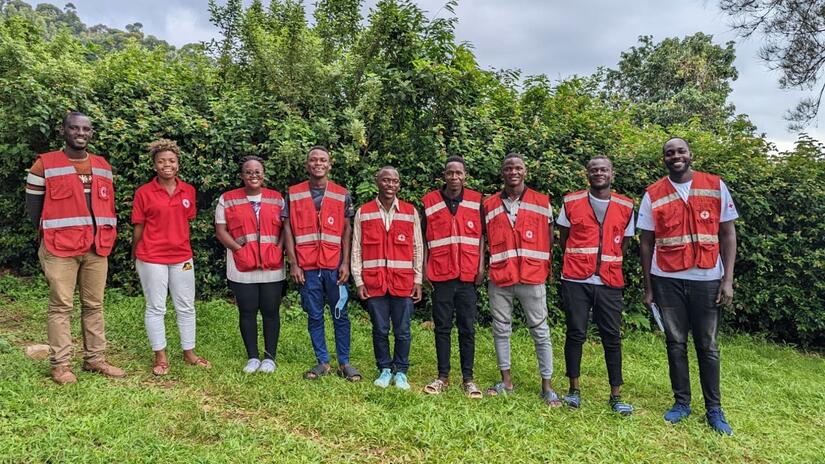
Dr Joseph Kasumba stands with trained safe and dignified burials volunteers from the Uganda Red Cross.
Photo: Uganda Red Cross Society
If you found this story interesting and would like to learn more:
- Visit the Uganda Red Cross Society website
- Click here to learn more about the Community Epidemic and Pandemic Preparedness Programme (CP3). Funded by USAID, CP3 supports communities, National Societies, and other partners in seven countries to prepare for, prevent, detect, and respond to disease threats.

